Vascular neurology fellowship


The Corewell Health – Grand Rapids/Michigan State University Vascular Neurology Fellowship program is a one-year, ACGME-accredited program that accepts two fellows each year. The fellowship program provides a broad clinical and academic experience that encompasses all aspects of care in vascular neurological disorders.
Overview
The Corewell Health – Grand Rapids/Michigan State University Vascular Neurology Fellowship program is a one-year, ACGME-accredited program that accepts two fellows each year. The clinical rotations take place at Corewell Health in West Michigan, a Joint Commission-accredited and certified comprehensive stroke center. It is the largest and busiest comprehensive stroke center in Michigan, with unmatched access to advanced clinical care and imaging technology. The facilities include two floors dedicated to neurology with a designated 12-bed stroke unit; 12-bed neuro intensive care unit, experienced APPs and 24-hour house-staff support.
The fellowship program provides a broad clinical and academic experience that encompasses all aspects of care in vascular neurological disorders. Our high acute stroke and endovascular procedure volumes (e.g., 1,500+ stroke admission and 150+ thrombectomy annually) provides fellows the opportunity to care for patients with complex vascular neurological disorders. Fellows take care of patients within the acute and telestroke services, neuro intensive care unit and outpatient clinic service, including TIA clinic. Additionally, fellows gain knowledge and experience across various areas of expertise through their neurosonology, neuroradiology, interventional neurology and neurorehabilitation rotations. Fellows also participate in several multi-institute cerebrovascular clinical trials. Upon completion of the fellowship training, fellows are eligible for vascular neurology board certification and neurosonology certification. Read our full program aims.

+ Butterworth Hospital
Comprehensive Stroke Program
- Blodgett Hospital
Primary Stroke Program - Zeeland Hospital
Primary Stroke Program - Pennock Hospital
Primary Stroke Program - Big Rapids Hospital
Primary Stroke Program - Greenville Hospital
Primary Stroke Program - Ludington Hospital
Primary Stroke Program
*Application in process
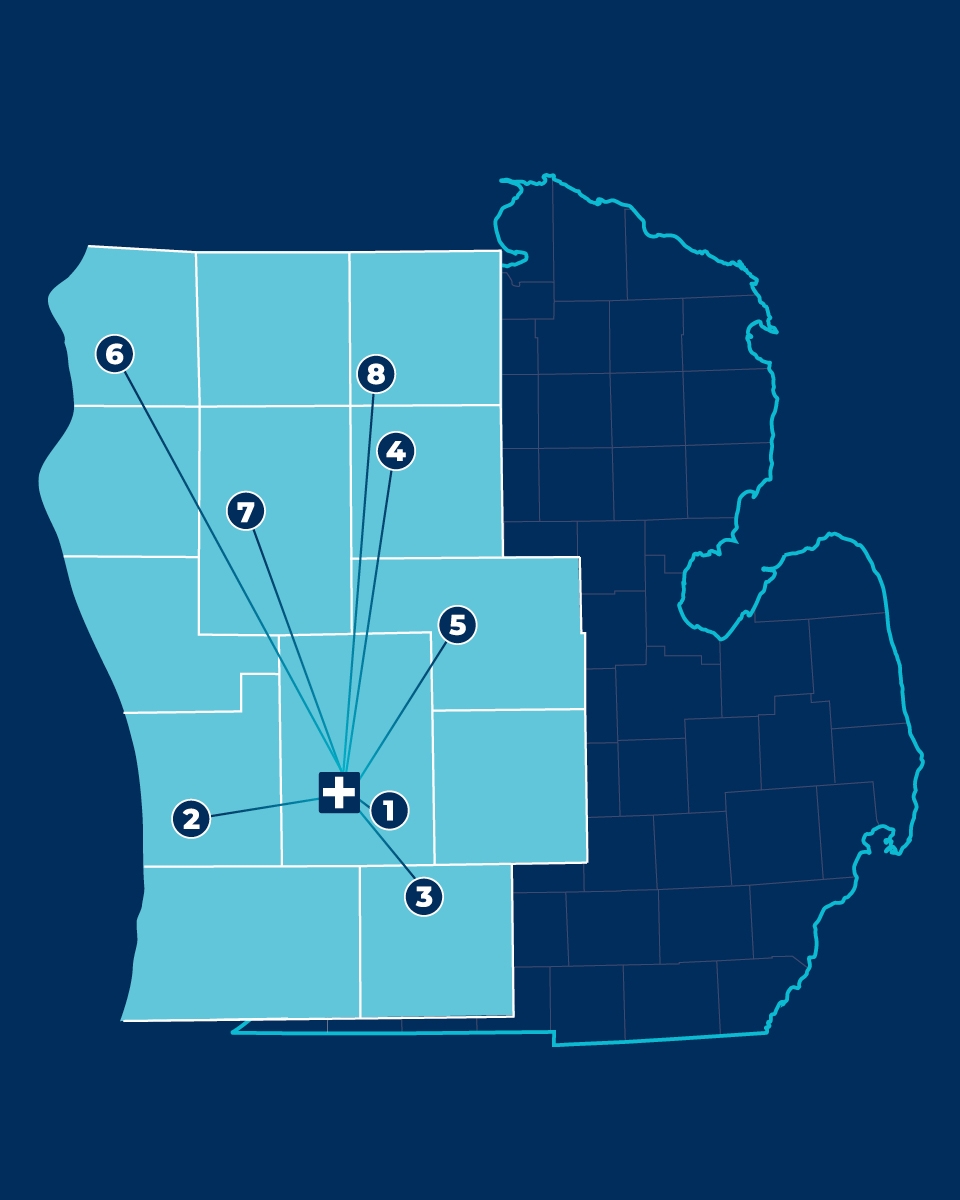

| Location | Program | Award | |
| Butterworth | Comprehensive Stroke Program | Gold Plus Honor Roll Elite Award
| 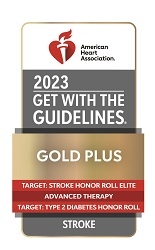 |
| Blodgett | Primary Stroke Program | Silver Plus Award
| 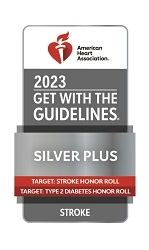 |
| United | Primary Stroke Program | Gold Plus Award
Rural Bronze Award | 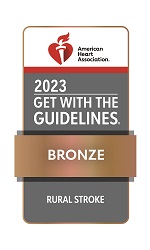 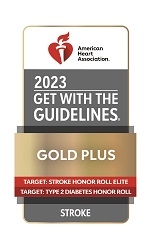 |
| Ludington | Primary Stroke Program | Silver Plus Award
Rural Bronze Award |   |
| Zeeland | Primary Stroke Program | Gold Plus Award
|  |
| Pennock | Primary Stroke Program | Rural Bronze Award |  |
| Big Rapids | Primary Stroke Program | Rural Bronze Award |  |
Education
Clinical environment
Corewell Health Butterworth Hospital (part of Corewell Health Grand Rapids Hospitals) is the primary training site. It is the largest medical center in West Michigan, a level one trauma center with 1,100 beds, a NAEC level IV epilepsy center, the home of AeroMed emergency helicopter service, the hub for 15 regional hospitals and an established telestroke program. There are more than 1,500 patients admitted to the stroke service annually. As the largest comprehensive stroke center in Michigan, our stroke program performed 192 thrombectomy cases in 2019 alone. Through our strong collaboration with Michigan State University and Van Andel Research Institute, fellows are strongly encouraged and supported in their development of independent clinical projects and/or other scholarly activities. Teaching opportunities for fellows abound; fellows participate in the neurology lecture series and lead various medical student and resident didactics throughout their training year.
Curriculum
The one-year training program is based on the American Board of Psychiatry and Neurology (ABPN) curriculum and the ACGME requirements. The program provides a stand-alone inpatient stroke primary service and a separate stroke consult service, each staffed by its own vascular neurology faculty and team of APPs/residents. Rotations (13 four-week blocks) include:
- Stroke primary admission and stroke consult services (seven blocks)
- Neuroradiology (one block) Endovascular neurosurgery (half block)
- Neuro rehabilitation (half block)
- Neurosonology (one block)
- Neuro intensive care unit (one block)
- Research/elective (two blocks)
Fellows participate in stroke clinic half-day a week throughout the fellowship year. The inpatient stroke service provides educational opportunities to care for patients with acute stroke, including thrombolysis and endovascular therapy, as well as manage patients with neurovascular disorders in the neuro intensive care unit setting. The stroke clinic provides broad educational opportunities to evaluate patients with complex neurovascular conditions and follow up with stroke patients after their hospital discharge. Fellows learn the principles and techniques, as well as perform and interpret, of transcranial and carotid doppler ultrasonography though the neurosonology rotation. Fellows can elect to include a cardiovascular rotation at our state-of-the art Corewell Health Grand Rapids Hospitals Fred & Lena Meijer Heart Center to learn advanced cardiogenic stroke management from cardiovascular perspective. In addition, fellows have the unique opportunity to elect a pediatric vascular neurology rotation at Corewell Health Helen DeVos Children's Hospital (part of Corewell Health Grand Rapids Hospitals). Fellows are expected to expand curriculum opportunities to incorporate experience in a video-based telestroke consultation.
Didactics and conferences
A variety of seminars and conferences are planned to strengthen fellow education. Fellows attend dedicated vascular neurology, neuroradiology, and endovascular neurosurgery lecture series covering all relevant basic science and clinical aspects. Fellows attend neurosciences grand rounds and are invited to present once at neuroscience grand rounds at the end of their fellowship year. Basic science didactics include the following broad topics:
- Cerebrovascular anatomy: normal and common variants of cerebral arteries and veins; aortic arch and pre-cerebral arteries; cerebral venous sinuses and jugular system; arterial supply zones and watershed regions; vascular supply of the spinal cord; and embryologic development
- Cerebrovascular physiology: cerebral blood flow and auto-regulation; cerebral oxygen and energy metabolism; and blood brain barrier
- Cerebrovascular pathology: vascular pathology, atherosclerosis, and aneurysm development; pathology of cerebral infarction and hemorrhage; excitotoxity, ischemic cascade, edema development, and inflammation; pathology of neuro-intervention- angioplasty, restenosis, and thrombectomy
- Hemostasis and coagulation cascade: platelet activity, aggregation, activation, and molecular mediators; coagulation pathways and molecular mediators
- Cerebrovascular pharmacology: anticoagulants, antiplatelet agents; thrombolytic agents; embolic agents
- Neuro epidemiology
- Medical ethics
- Quality assurance
A list of conferences is provided throughout the fellowship year; fellows, attendings, neurology residents and APPs are expected to attend. These conferences include:
- Vascular neurology lecture series (monthly)
- Carotid artery disease and neuro-endovascular boards (weekly)
- Brain-heart meeting: discuss cardiogenic or ESUS stroke management (monthly)
- NIH StrokeNet webinar grand rounds (monthly)
- Vascular neurology journal club (monthly)
- Neurology morbidity and mortality conference (monthly)
- Neurology grand rounds (bi-monthly)
- Multi-institute stroke collaborative meeting (quarterly)
Research
In addition to the heavily clinical experience in our comprehensive stroke center, there are many opportunities for fellows to participate in innovative clinical research and other scholarly activities. Within the first month of fellowship, fellows complete the American Academy of Neurology’s evidence-based medicine online modules to reinforce and supplement their knowledge of the basic principles of evidence-based medicine and research. Fellows attend eight hours of lectures within the first three months of starting their fellowship covering a variety of research topics that include ongoing stroke clinical trials in our comprehensive stroke center as part of the NIH StrokeNet. Our vascular neurology faculty has a wide variety of clinical and biomedical interests that will be available to mentor fellows participating in scholarly activity. Fellows can participate in ongoing departmental research projects or lead their own projects during their training year. The scholarly activity and scientific support team within the Office of Research, as well as the vascular neurology faculty, will further supplement and mentor fellows on how research is conducted, evaluated and explained to patient and applied to patient care. The Office of Research provides resources including statistical analysis, support for research and oversight of research facilities.
The state-of-the-art research facilities and resources at Michigan State University College of Human Medicine Grand Rapids campus and Van Andel Research Institute are available to fellows. Fellows are encouraged to attend the annual international stroke conference by the American Stroke Association and the annual regional cardio-cerebral vascular conference. Fellows are required to complete at least one abstract and submit to a national meeting. Ideally, fellows should also submit one manuscript to a peer-reviewed journal during their fellowship.
The Comprehensive Stroke Center at Butterworth Hospital is an active site in many multicenter clinical trials. Fellows are strongly encouraged to play active roles in recruiting patients, data collection, and follow-up, as well as develop research projects under the mentorship of the stroke faculty. Fellows receive support to attend at least one regional, national, or international conference during their training year.
Application requirements
Applications to the Corewell Health - Grand Rapids/Michigan State University College of Human Medicine Vascular Neurology Fellowship are accepted through the Electronic Residency Application Service (ERAS). We participate in the National Resident Matching Program (NRMP) Medical Specialties Matching Program. Eligibility requirements include:
- Applicants must complete a four-year ACGME-accredited neurology residency program before entry into the fellowship program, applicants who complete an RCPSC-accredited or CFPC-accredited residency program located in Canada before entry into the fellowship program are also eligible
- Applicants must possess U.S. work authorization or be eligible for J-1 visa status
- Applicants must be a MD or DO
- Applicants must have strong communication skills
- We do not have minimum USMLE Step 1, Step 2 CK, or Step 3 score requirements
For more information, please contact Kara Sutter, vascular neurology program coordinator.
Salary and benefits
Explore West Michigan


Food: Release your inner foodie exploring one of the top food cities in the US.
Entertainment: From zoos and museums to festivals and art, there is a new experience around every corner.
Shopping: West Michigan has a diverse assortment of shops for everyone.

Outdoors: With trails, lakes and more, there is so much of West Michigan to explore.
Sustainability: Located along the shore of Lake Michigan, West Michigan has many initiatives to protect our natural resources.

Identities matter and so do you! Our residency and fellowship programs offer social activities, wellness programs and a diversity council to foster respect, personal health and community.
Program Director
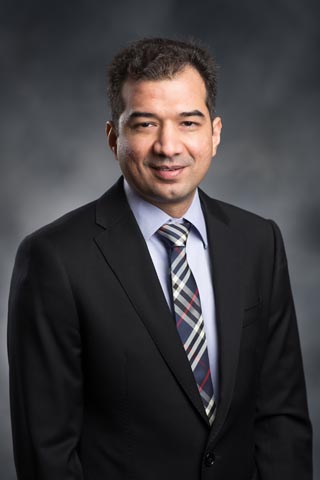
Vascular Neurology
- Residency: Neurology, Southern Illinois University School of Medicine
- Fellowship: Vascular Neurology, University of Texas Southwestern Medical Center

Vascular Neurology
- Residency: Neurology, Southern Illinois University School of Medicine
- Fellowship: Vascular Neurology, University of Texas Southwestern Medical Center
Core Faculty

Vascular Neurology
- Residency: Neurology, Spectrum Health/Michigan State University College of Human Medicine
- Fellowship: Vascular Neurology, Spectrum Health/ Michigan State College of Human Medicine
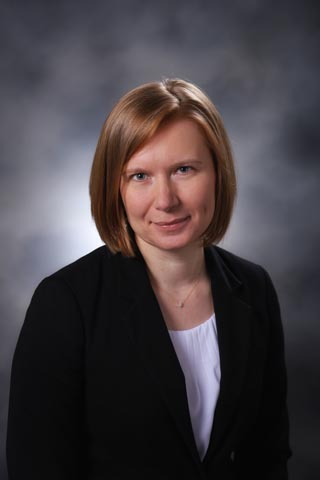
Vascular Neurology
- Residency: Neurology, University of Massachusetts Medical School
- Fellowship: Vascular Neurology, University of Pittsburgh Medical Center
.jpg)
Vascular Neurology
- Residency: Neurology, Sparrow Hospital/Michigan State University
- Fellowship: Vascular Neurology, Sparrow Hospital/Michigan State University
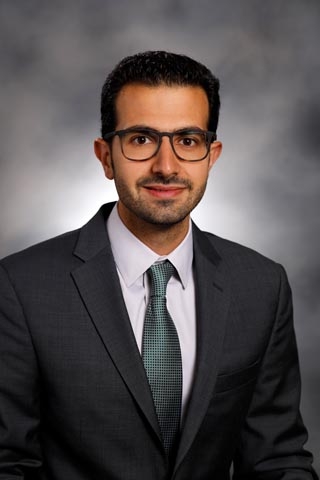
Vascular Neurology
- Residency: Neurology, Medical College of Georgia - Augusta University
- Fellowship: Vascular Neurology, Medical College of Georgia - Augusta University

Vascular Neurology
- Residency: Neurology, Spectrum Health/Michigan State University College of Human Medicine
- Fellowship: Vascular Neurology, Spectrum Health/ Michigan State College of Human Medicine

Vascular Neurology
- Residency: Neurology, University of Massachusetts Medical School
- Fellowship: Vascular Neurology, University of Pittsburgh Medical Center
.jpg)
Vascular Neurology
- Residency: Neurology, Sparrow Hospital/Michigan State University
- Fellowship: Vascular Neurology, Sparrow Hospital/Michigan State University

Vascular Neurology
- Residency: Neurology, Medical College of Georgia - Augusta University
- Fellowship: Vascular Neurology, Medical College of Georgia - Augusta University
Class of 2024
.jpg)
Neurology: University of Mississippi Medical Center
.jpg)
Neurology: University of Mississippi Medical Center
Ready to Apply?
We participate in the National Resident Matching Program and use the Electronic Residency Application Service.


